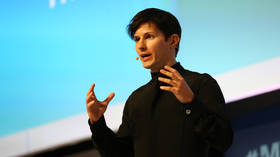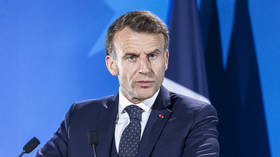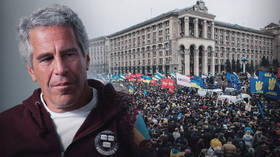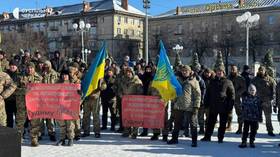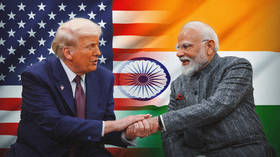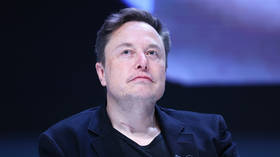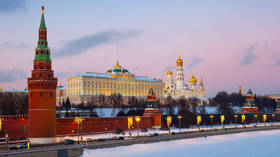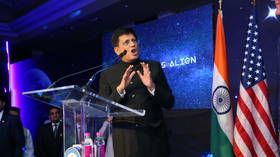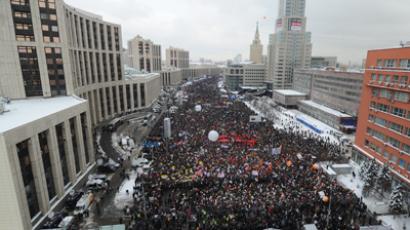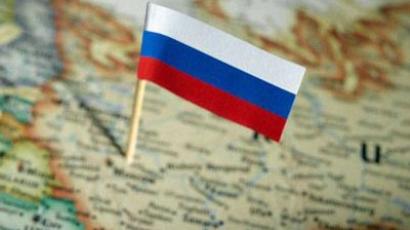Back in the saddle, Putin faces uphill ride
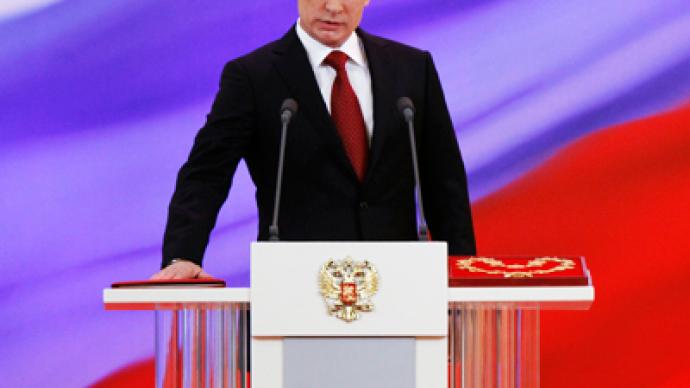
The newly inaugurated Russian President, Vladimir Putin, is no stranger to controversy and challenges. The question remains, however, whether the seasoned politician will be able to adjust himself to shifting political ground both at home and abroad.
Much like the start of his first presidential term back in 2000, Vladimir Putin finds himself surrounded by an assortment of enemies. This time around, however, the overt threat is not related to militants in the Caucasus, or oligarchs camped out in the Kremlin. Indeed, Chechnya never looked better, while doing business in Russia no longer carries the grave risks it once did.Today, it is the United States and NATO that are testing Russia’s patience and resolve with the construction of a missile defense shield on the territory of former Warsaw Pact countries. Military analysts say the system has the ability to eventually overwhelm Russia’s nuclear deterrent, leaving the country wide open to attack. With allies like this, many in Russia are wondering, who needs enemies?More importantly, however, at least in the short term, is Russia’s politically-charged domestic situation. Despite his past achievements, or because of them, Putin has attracted his share of outspoken, internet-savvy detractors. They argue that Putin will lead the nation to demise. The irony of such criticism, which attempts to equate stability with stagnation, is that it ignores the fact that it was Vladimir Putin who invigorated the Russian economy during his first two terms as president. Indeed, if anybody knows how to fix a broken economy, it is Putin.Although he was fortunate to have high oil prices underwrite many of his generous social programs, his critics overlook the courage it required to sweep the oligarchs out of the Kremlin, where they had come to roost during the Yeltsin years. Since then, Putin has earned the respect of enemies and friends alike, and this has redounded to the economic benefit of average Russians in countless ways. Another argument from the leaderless opposition camp is that the Putin-Medvedev “tandem” engaged in a “job swap.” Former President Dmitry Medvedev, the argument goes, was just keeping Putin’s seat warm for the last four years. The reality, however, is a bit more complicated. Medvedev, a highly successful politician in his own right, pushed through dozens of reform initiatives on his watch. Today, all politicians, as well as their family members, must report the origin of their wealth to the tax authorities. Members of the police force, meanwhile, must submit to annual examinations. Thanks to these efforts, corruption, while still the scourge of the nation, is beating a steady retreat. Despite these successes, Medvedev ultimately heeded the democratic will of the Russian people, as well as the opinion polls, and stepped aside for Putin, the perennial crowd favorite. Ironically, this act alone demonstrated the former president’s leadership qualities. Medvedev’s decision allowed Vladimir Putin to go on and win a crushing 63.6% of the votes in the March 4 presidential election. Although the victory was achieved by a narrower margin than Putin’s previous showings at the polls, it still represented overwhelming majority support across the nation. Some political analysts are concerned, however, that in the heat of the presidential campaign euphoria Putin may have promised Russian voters more than he can deliver. In a series of articles published in Russian newspapers in the run-up to the presidential election, Putin outlined his ambitious plans for rebuilding Russia on the social, economic and political fronts. Among some of the tasks on his lengthy to-do list, Putin stressed the need for the Russian economy to generate “25 million new, high-tech, well-paid jobs for people with higher education,” while raising the wages of teachers, doctors and other professionals. He also spoke at length on the condition of democracy in the nation. “We need to tune the mechanisms of our political system in such a way that it will account for, and reflect the interests of major social groups and publicly reconcile those interests,” he advised. “In addition to providing a legitimate government, our political system should guarantee that people see it as fair – even when they are in the minority.”With the global economy down and protest fever up, the political opposition will be watching intently to see how President Putin lives up to these bold campaign pledges. Given the overall pessimistic mood of the people, not only in Russia, but across the developed world, Putin can expect to hear more vocal criticism as he settles into the Kremlin for his third presidential term, which may see him holding onto power until 2024.However, from a recent exchange between Vladimir Putin and Aleksei Venediktov, the editor-in-chief of Ekho Moskvy, a liberal radio station, it seems that Putin will be far less willing to take criticism lying down in the future. After inviting Putin to submit articles to a news program outlining his plans for the country, Venediktov pushed his luck by reminding him to discuss his policies not only with political allies, but also with the opposition. “I am ready personally, and all my colleagues are ready, to meet with them and to talk…we have invited them more than once, but they never turned up,” Putin replied. “They are saying that they want to have a discussion but the authorities do not hear them.” The Russian leader wondered whether the opposition merely wished to demonstrate without any discussion taking place.Putin added that he could not understand certain comments about the US missile defense plans on Ekho Moskvy – even though the radio belongs to a Russian media company – given that the project is being carried out on the orders of the United States.At this point, Putin addressed Aleksei Venediktov directly.“Do you feel offended by my words?” Putin asked.When the journalist said he was, Putin replied “it’s me who should be offended; it’s me who gets covered with diarrhoea from head to foot round the clock.”“I was joking, I am not offended,” Venediktov replied.“Well, I was not joking,” Putin said, ending the exchange.
The international challengePutin the hardnosed pragmatist will also be forced to re-examine Russia-US relations, which have been severely strained due to Washington’s determination to install a missile defense shield in Eastern Europe, just miles from the Russian frontier. During his time as president, Dmitry Medvedev repeatedly warned the US and NATO they were risking the outbreak of another arms race if they moved ahead with missile defense without Russia’s participation. Russian military officials say the system poses a serious threat to national security. Last week, Nikolai Makarov, the Russian Chief of the General Staff, warned that the full deployment of the US missile defense system could eventually eliminate Russia’s nuclear deterrence potential."We believe that over time it will be possible to block all Russian ballistic missiles launched both from Russian territory and from submarines in the ocean," Makarov told an international missile defense conference in Moscow. "We are saying that until about 2017 the creation of the missile defense system will not affect Russia's strategic nuclear forces, but with the third and fourth stages it will begin to pose a threat.”Thus far, Moscow has only received verbal assurances that the system will never be aimed at Russian territory (which brings to mind the same verbal assurances given to Russia following the collapse of the Soviet Union, when it was promised that NATO would not expand further). US officials refuse to provide Moscow with written guarantees that the system will never be used to compromise Russia’s nuclear defenses in some hypothetical future event. With Putin once again in the Kremlin, however, it would be safe to bet that the fair warnings will cease and the preemptive nut and bolt work will begin. After all, it was Putin who delivered a powerful rebuke of America’s military presence around the world during his Munich Speech at an international security conference in early 2007.“Today we are witnessing an almost uncontained hyper use of force – military force – in international relations, force that is plunging the world into an abyss of permanent conflicts,” Putin stated. “One state, of course, first and foremost the United States, has overstepped its national borders in every way.”The warnings, however, continue to go unheeded, while Europe risks becoming once again a mere spectator to a game of nuclear badminton in its own backyard.General Makarov has already warned that, taking into account a missile defense system’s “destabilizing nature,” Russia might make a decision to launch a preemptive strike against European missile defense sites in the event that the “situation worsens.” Fortunately, neither Moscow nor Washington has shown any desire to toss in the towel on their “reset” efforts. There is still hope of salvaging the bruised bilateral relationship, especially if US President Barack Obama is able to emerge victorious against a Republican challenge in November. As an embarrassing “open-mic” incident recently revealed, the Obama administration will have much more freedom to engage Russia on missile defense after the November elections. That is, assuming Barack Obama can avoid pulling defeat from the jaws of victory. A slip in the wrong direction between Moscow and Washington, however, will definitely shift the geopolitical calculus as Russia looks for “trusted” allies. Thus, Putin may be tempted to strengthen bilateral relations with China, which has also expressed its concern over the US-NATO sprawl. Whatever the case may be, Vladimir Putin will have his work cut out for him as he attempts to prove, once again, that he is the right man at the right time during a period of history when Russia faces yet another round of serious challenges.Robert Bridge, RT


